Hypoglycemia And Tiredness
Hypoglycemia can be a cause of fatigue. Find out why understanding the role of sugar and insulin in the body is crucial for anybody who suffers from frequent tiredness.
What is hypoglycemia?
The definition of hypoglycemia is low blood sugar, which can be caused by either not eating (fasting) or over- production of insulin. The latter is more common as insulin regulates the sugar in the bloodstream. We eat lots of sugar, both knowingly, as well as unknowingly, since sugar is used in much of the processed food that we consume.
In the past, sugar was an extreme rarity. Nowadays, the average American consumes 200 lbs of sugar each year, which is far more than our systems can cope with. Sugar improves our mood and gives us a quick boost in energy. This is where our body misleads us. We feel better only temporarily, and then our mood usually comes crashing down when blood sugar levels abruptly fall. Fatigue is common at this stage. To deal with the excess sugar, the adrenal glands also release cortisol and adrenaline. Over time, your adrenal glands become at risk of adrenal exhaustion. Furthermore, the excess sugar is often stored as fat, putting your body under even more strain.
The causes of hypoglycemia include:
- Ingesting too much refined sugar, particularly on an empty stomach
- Adrenal exhaustion
- Lack of essential nutrients – vitamins, minerals and amino acids to process sugar properly.
It is important to get a handle on hypoglycemia as early on as possible since it can lead to diabetes on the long run. Understanding which foods to eat and which to avoid should also help you gain energy and lose weight.
[For more details please seeHigh glycemic index foods make you tired.]
What are the signs and symptoms of hypoglycemia?
The main symptoms are:
- Dizziness
- Blurred vision
- Fuzziness of thought
- Mental confusion
- Irritability
- Fatigue
- Paleness
- Sweating
- Mood swings
By taking the following questionnaire you will be able to assess your risk of hypoglycemia. Remember that things can change, so it might be wise to take this questionnaire from time to time.
The Hypoglycemia questionnaire
Answer the following questions and score yourself according to the following criteria:
Never -- 0
Rarely -- 1
Occasionally --2
Often -- 3
Do you… | Score |
Often feel anxious or nervous? | |
Think of yourself as overweight? | |
Experience tiredness in the afternoon? | |
Feel dizzy after standing up? | |
Suffer from frequent headaches? | |
Feel tired about an hour after eating? | |
Experience heart palpitations? | |
Sometimes feel shaky? | |
Feel tired or weak if you miss a meal? | |
Occasionally get blurred vision? | |
Suffer from depression or mood swings? | |
Feel irritable if you miss a meal? | |
Crave sweets? |
Now add up your total for all for columns.
If you scored:
- Less than 5 – Hypoglycemia is probably not a factor
- Between 6 -15 – Hypoglycemia is likely and should be investigated further
- Greater than 15 – Hypoglycemia is extremely likely and it would be wise to get it checked out as soon as possible.
The clinical diagnosis is usually done with a GTT (Glucose Tolerance Test). After fasting for 12 hours, the patient is made to drink something very sweet, and then the rate at which the blood glucose falls is monitored.
What is the best treatment for hypoglycemia?
In order to keep your blood sugar stable, it is wise to choose foods with a low glycemic index (GI). The GI runs from 0 to above 150. Below 50 is considered low, above 50 is considered moderate to high, and above 100 is considered very high. The index measures how long the sugar in the carbohydrate takes to be processed by the body. Pure sugar goes into the blood stream very fast. Foods, with a lot of fiber that needs to be broken down (for example most vegetables), enter the blood stream much slower. The slower the release of sugar, the lower the GI count is.
Foods with low GI include: many fruits and most vegetables as well as nuts, whole grains, legumes, and pulses. As a rule of thumb, avoid white foods e.g. white bread, white pasta, and potatoes. Make your plate a rainbow of colors with foods, such as tomatoes, egg plants, and red cabbage. Always choose whole meal bread over white bread and snack on fruits and nuts.
If you do eat high glycemic index foods, make sure that you don’t do this on an empty stomach. Dessert taken at the end of the meal, when there is other food to buffer its effect, is much less likely to spike your blood sugar than dessert taken on its own.
[For more details and a list of GI foods please seeGlycemic index of common foods.]
It is also important to take care of your adrenal glands. Adrenal exhaustion may have contributed to hypoglycemia, or it may be a result of it, so improving the health of your adrenals will certainly help with any case of hypoglycemia. Key points to watch for are:
- Reduce your general stress levels, through simplification, lifestyle changes and downsizing if necessary.
- Practice relaxation as often as you can (once a day is ideal) either in the form of mediation, progressive muscle relaxation or perhaps listening to soothing music.
- Improve your sleep hygiene by making your bedroom as sound-proof as possible, and as dark as you can.
- Avoid stimulants, such as caffeine, nicotine and alcohol and choose non-processed foods.
[For more details please seeAdrenal fatigueandSelf help for adrenal fatigue.]

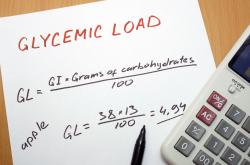

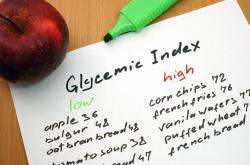



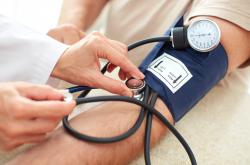
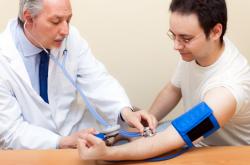
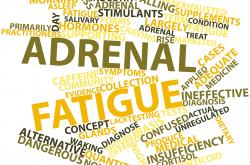









Leave a comment